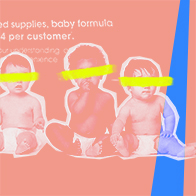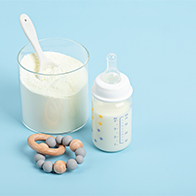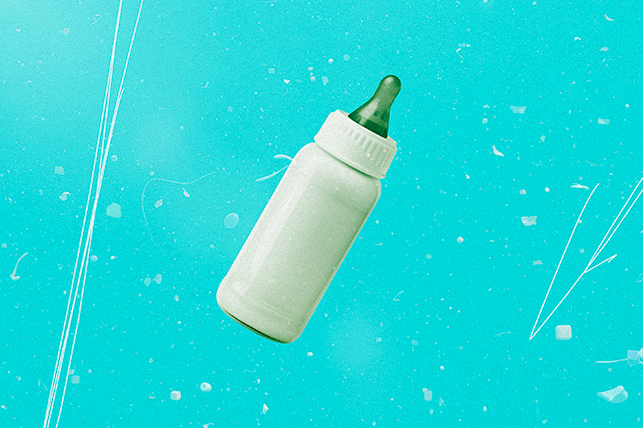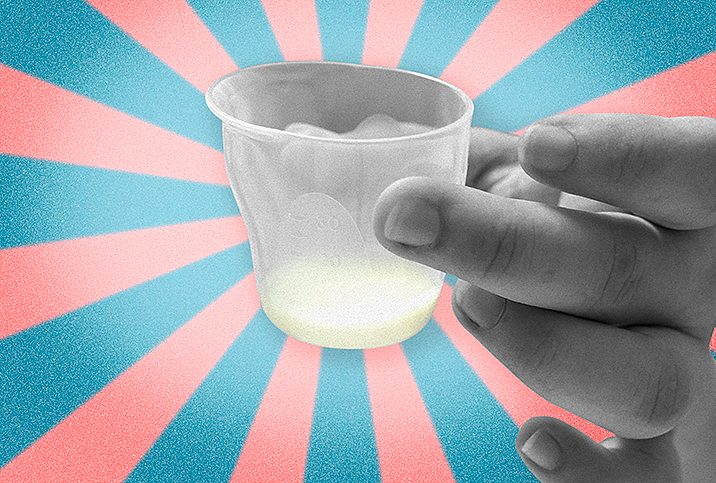Is Breast Milk Sharing Safe?

People have shared breast milk for thousands of years. Before the invention of baby formula, mothers—including royals and nobility—frequently employed wet nurses to feed their children if they were unable or unwilling to do so.
Although use of wet nurses dramatically declined in the late 1800s, the demand for third-party donations did not. Today, parents and hospitals around the globe continue to rely on donor milk to provide for children in need. Most people go through milk banks with robust safety protocols, including stringent screening and pasteurization processes. But others exchange milk on the open market, a practice some say puts babies' health at risk.
Benefits of breast milk
Experts often say "breast is best" because a parent's milk is a superfood for babies, containing all the essential nutrients for healthy growth and development.
"Additionally, the parent who gives birth transmits protective immunity to the infant that can help protect them from disease in the early months of life when they are most susceptible," said Christina Johns, M.D., a pediatric emergency care physician in Washington, D.C., and senior medical advisor at PM Pediatric Care.
Babies who receive breast milk are less likely to develop bacteremia (bacteria in the bloodstream), urinary tract infections, lower respiratory tract infections and necrotizing enterocolitis (the death of tissue in the intestine). They also have a reduced risk of sudden infant death syndrome (SIDS) and autoimmune diseases, such as asthma and type 1 diabetes.
Every breastfeeding parent's milk is specific to their own and their child's metabolic balance, explained Divya Parikh, M.D., a pediatric physician and board-certified lactation consultant at Central Ohio Primary Care.
Still, donor milk provides most of the same nutritional benefits, making it significantly more advantageous than formula.
Moreover, Johns and Parikh said some babies, especially those born prematurely, cannot tolerate or easily digest formula and, thus, might not absorb necessary nutrients. Children born with complications are also more susceptible to infection, making the immune-protective properties of breast milk especially vital.
Donated breast milk is lifesaving for some babies
Nicole Gangi, of Revere, Massachusetts, relied on donor milk from Mothers' Milk Bank Northeast when her son, Demitri, was born prematurely at 34 weeks, necessitating three weeks in the neonatal intensive care unit (NICU) and special care nursery.
"I won't lie and say I did not think about the stigma of people complaining about using someone else's breast milk, but to me, it was a no-brainer. My son was already going to be going through enough in the NICU," Gangi said. "I told myself I would be silly not to take this precious gift for my son. The donor milk would give him the nutrients he needed without causing him more discomfort, so he can continue to grow and, hopefully, thrive.
"Knowing my son would receive donor milk took a world of pressure off me," Gangi continued. "I did not have to worry about how much I was producing while I waited for my milk to come in. It gave me time to really work with lactation coaches and learn the various tips and tricks about pumping."
Gangi had previously struggled to breastfeed her daughter, who was born tongue-tied and had difficulty latching. When the baby began to show signs of jaundice, Gangi switched to formula.
"I tried the different [nipple] shields to help her feed, but it did not make a difference. Having come from a family who did not breastfeed and being a first-time mom, I found breastfeeding to be a bit overwhelming," Gangi said. "If donor milk were an option for her, I would have chosen it. I could have taken the time to work through these issues and not be worried my baby would be sick."
'I did not have to worry about how much I was producing while I waited for my milk to come in.'
The American Academy of Pediatrics (AAP) recommends babies exclusively breastfeed until they are about 6 months old and continue breastfeeding with supplementary foods or formula until they are at least 1 year old. However, according to the Centers for Disease Control and Prevention (CDC), while most babies begin life on breast milk, only one-quarter receive breast milk exclusively through 6 months old, and only 35 percent are still breastfeeding by their first birthday.
Lindsay Groff, executive director of the Human Milk Banking Association of North America (HMBANA) in Fort Worth, Texas, said about 80 percent to 85 percent of the organization's donations go to babies in NICU. Up to 70 percent of parents with infants in NICU cannot provide all of their baby's feeding needs, at least initially. Children with acquired or congenital gastrointestinal or cardiac conditions, severe allergies, immunological issues, malabsorption issues and other medical complications greatly benefit from donations, too.
The obstacles to breastfeeding vary but frequently involve latching or lactation difficulties, which are prevalent with premature births. Maternal health conditions, such as diabetes, hypothyroidism and certain medications, may also inhibit breastfeeding.
Breast milk sharing on the open market
Although the recent formula shortage in the United States exacerbated the issue, the demand for breast milk donations has been rising for years, and milk banks nationwide are struggling to keep up. Groff said the HMBANA network distributed 9.2 million ounces in 2021, an increase of 22 percent from the previous year.
Besides insufficient supply, the price can be prohibitive, as donations are expensive to facilitate. While insurance foots the bill for some families, others must pay between $3 and $5 per ounce. That price is just enough to cover the costs of screening donors for substance use and viruses, such as HIV, hepatitis and other bloodborne pathogens; processing the milk; and shipping it securely in a container packed with dry ice. Families also need a prescription from their child's doctor to get milk from an official bank.
For those parents unable to receive milk from a local milk bank, some turn to sites such as Craigslist and Facebook Marketplace. Here, lactating parents with excess milk sell or donate their supply, either transferring it in person or by mail, often through groups such as Human Milk 4 Human Babies Global Network. Some also seek and provide donations through in-person social networks, including friends or neighbors.
A 2019 AAP survey found that of 650 respondents, 50 percent were unconcerned with the safety of informal breast milk sharing. About 80 percent didn't screen donors because they "trusted them," and over half said they didn't use the milk bank because of cost or concerns about the ability to get a prescription.
Gangi said she's aware of the controversy around informal milk sharing and understands parents' motivations, though she would not go this route herself.
"I think a lot of people are desperate to find formula, so they are resorting to using alternate brands or sources, such as breast milk," she said. "I would spend many hours looking online, driving to store after store, and I even had to ask my family who lived in towns further away from me to help me find formula. It was very stressful, so I understand why parents are concerned."
The AAP, CDC and Academy of Breastfeeding Medicine (ABM) advise against informal milk sharing due to the potential for contamination. Studies have found some human milk sold online contains cow's milk, bacteria and other potentially harmful components.
"Open market is not always wise as the health status of the milk donor may be unknown or not guaranteed, and the pasteurization process may not happen or may be substandard and can cause milk to be contaminated," Johns warned.
However, some experts disagree. At an American Medical Association (AMA) House of Delegates meeting in June 2022, several attendees opposed the association's draft policy that discouraged informal breast milk sharing. One of those opponents, Carolynn Francavilla Brown, M.D., an alternate delegate from Colorado, said informal milk sharing's negative reputation is unfounded and argued the milk is "clean, well-stored" and free of medications or supplements.
"There's nothing nefarious going on here," she said, according to a report from MedPage Today. "It is milk that is good enough for their own baby. There is no reason it wouldn't be good enough for someone else's baby."
Delegates for the Women Physicians Section suggested an amendment to the resolution that would encourage milk sharing "along with the development of standards that promote both safe and equitable access." The amendment received support from several attendees, some of whom, like Francavilla Brown, argued informal donations can be a viable alternative for parents who cannot get supplies from a bank.
The need for vetted breast milk donors
The debate on open-market sharing of breast milk remains unresolved, but it is clear the need for donors at accredited milk banks is incredibly high.
"I would love to see breast milk donations become as popular as donating blood. At least from the circle of people I know, they did not know donating breast milk or receiving breast milk was an option until they spoke to me," said Gangi, who became a donor herself.
"It was a wonderful gift we received to help our son," Gangi continued. "I think about the same-sex couples who have babies, those who use surrogates, those who adopt, those who cannot get their supply to come in, those like me who struggled to get their supply, etcetera. Wouldn't it be wonderful for a system to be put in place so that they can have the option of donor milk, too?"
Leigh Coggiola-Belza, of Dallas, had a surplus of milk after the birth of her daughter and donated more than 20 pounds of breast milk through a local bank. Though the screening process is extensive, she said it is a worthwhile experience.
"All the work it takes to get your breast milk to a baby who needs it is well worth it. There may be blood tests and procedures that make it more time-consuming, but when you can walk into a hospital to drop off milk and know there's a baby beyond the walls that may be a recipient of donated breast milk, you're happy to help however you can," she said.




















